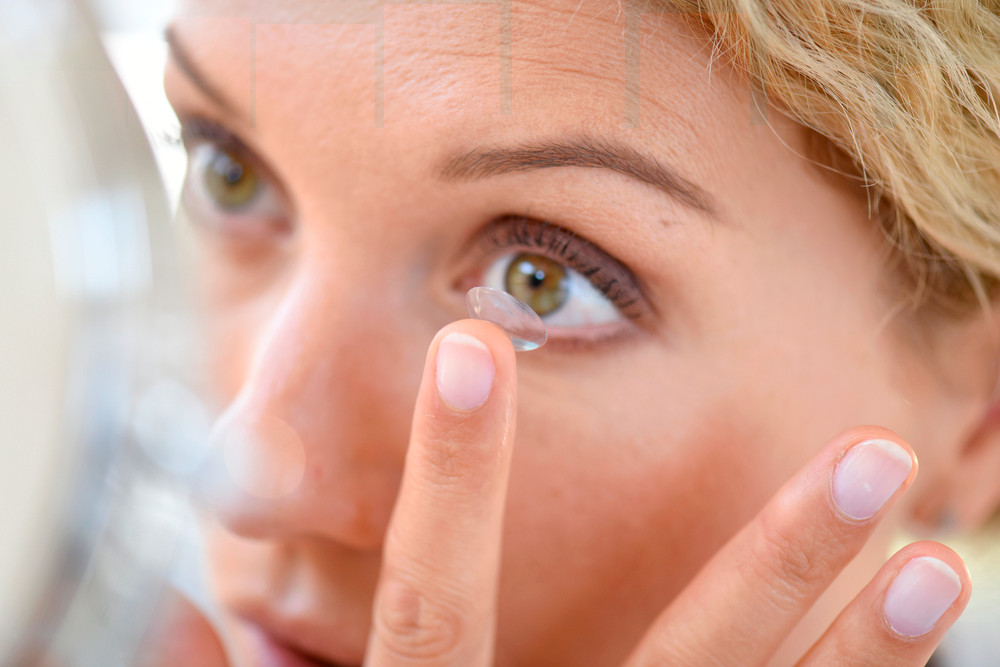Choosing Between Glasses or Contacts: Ask Your Hobart Optometrist
When it comes to vision correction, it’s the classic choice. Glasses or contact lenses.
Glasses can give you a sophisticated and stylish appearance. The wearer gets the opportunity to create their own individual “look”.
Contact lenses, on the other hand, eliminate the need for frames. You get to enjoy an unobstructed view and a sense of freedom.
Opting for glasses or contacts is a big decision. This is where an eye care professional with years of experience can help you make the best choice based on your prescription, preferences, and lifestyle requirements.
Our Hobart optometrists at Martin’s Eyecare can help you with your eyewear selection.

Prescription glasses (Pros)
- Because they require little maintenance or special care, glasses are a convenient, hassle-free way of improving vision. Compared to contact lenses, the daily upkeep of a pair of prescription frames is minimal.
- There are a wide variety of materials, colours, and shapes to choose from. You can have glasses that provide a trendy, modern look or a classic, sophisticated look. It’s always important to choose glasses that complement your face and enhance your overall appearance.
- Single-vision lenses correct for a specific vision correction. If you need glasses only for reading or distance, these might be the right choice for you. These types of glasses tend to be the most versatile in terms of offering a range of styles and materials to choose from. There are also progressive lenses for people who need vision correction at more than one distance. Progressive lenses have certain frame requirements. When you meet our Hobart optometrists, you’ll receive a comprehensive eye exam. We’ll help you pick out the frames that best suit your prescription needs.
Prescription glasses (Cons)
- The main disadvantage of glasses is that the frames can get in the way of peripheral vision. Wearers sometimes can’t see people or objects from the corners of their eyes.
- Fogging is another drawback, especially when going between two different extremes in temperature. In areas where the weather is quite changeable (like Tasmania!) or when engaging in activities that cause sweating, fogging is particularly frustrating.

Benefits of contact lenses
- Contact lenses will provide your face with the most natural appearance. They allow your eyes’ features and colour to shine through. And if you cherish individuality, coloured contact lenses are available that give a new look.
- Placing the contact lenses directly on the eye’s cornea provides a clear, unobstructed field of vision. No lenses or frames obstruct peripheral vision. They are particularly advantageous when participating in activities such as driving or sports where a wide field of vision is required.
- People with active lifestyles find contact lenses very suitable. They don’t interfere with physical activity. Compared to glasses, they provide a more secure fit. Contact lenses are great for participation in high-impact activities.
- Non-prescription sunglasses are generally cheaper than prescription sunglasses. So if you’re a person who likes to mix and match their sunglasses for different occasions, you can save money by having an “eyewear wardrobe” of non-prescription sunglasses to accompany your contact lenses.
Disadvantages of contact lenses
There are a few disadvantages to wearing contact lenses, however.
- You must follow a regimen of cleaning, maintenance, and replacement to prevent infection and ensure the health of your eyes. Following the recommendations concerning appropriate disinfection solutions and the wear schedule is part of the routine.
- Some people find contact lenses unsuitable. Their lifestyle or an underlying eye condition makes contacts problematic. A consultation with an eye care professional is necessary to determine whether contact lenses are even an option for you.
Different types of contact lenses
Four of the most common types of contact lenses are soft contact lenses, rigid gas permeable (RGP) lenses, Toric lenses, and multifocal contact lenses.
Soft contact lenses are flexible and breathable. They are made from materials that provide a comfortable fit. They are available in daily, weekly, or monthly options.
RGP lenses are produced from silicone-containing compounds that allow oxygen to pass through to the cornea. The lenses are an excellent solution for vision correction when people have irregular corneas or astigmatism. They are durable, easy to handle, and easy to clean.
People with astigmatism benefit from Toric lenses that are made specifically for people with that condition. The spherical and cylindrical components of astigmatism are corrected. The lenses come in soft and RGP options, which provide a personalised fit.
Those who have a condition known as presbyopia might benefit from multifocal lenses. Presbyopia affects near vision. Multifocal contact lenses provide clear vision at different distances. They eliminate the need for reading glasses or bifocals. These contact lenses also come in soft and RGP options.
Having this information about contact lenses makes it easier to make an informed decision. Your Hobart optometrist will help determine the most suitable contact lens fitting option.
One-day disposables OR extended-wear contact lenses
Disposable daily contact lenses are used once. They are a convenient and hygienic option. A fresh pair of lenses are worn each day and discarded at bedtime. You eliminate the hassle of cleaning and storing contact lenses. People who wear contact lenses less frequently also benefit from single-use lenses.
Extended-wear contact lenses are worn for a week to a month at a time. They are safe to wear when you sleep because they are usually made from silicone hydrogel, which permits higher oxygen permeability. These lenses are a convenient choice for people with busy schedules.
Importance of talking with your Hobart optometrist
During a consultation with your optometrist, we will conduct a comprehensive eye exam to determine the health of your eyes and the prescription needed to correct your vision. The eye checkup will identify underlying factors or conditions that impact the choice of eyewear. We’ll take into account your preferences, daily activities, and lifestyle before making a recommendation.
Don’t rely on guesswork or online research alone. It is always worth speaking with an optometrist who will answer questions and provide guidance on proper maintenance and care of the eyewear you purchase.


Additional eyewear options to consider
For people who are not fans of glasses or contact lenses, there are other options. These alternatives serve different preferences and needs and offer unique benefits. They include prescription sunglasses, prescription safety glasses, sports goggles, and computer glasses.
- Prescription sunglasses correct your vision and protect your eyes. Tasmania is a great place to live if you like the outdoors. But too much exposure to harmful UV rays can lead to eye damage. Your optometrist can help you select from a range of styles.
- Prescription safety glasses are important if you need vision correction but don’t like contact lenses. They are a little more expensive than non-prescription safety glasses, but they provide essential protection if you are doing hazardous activities at work or around the house.
- Sports goggles are an excellent choice for people with active lifestyles. They are durable and resistant to impact.
- Computer glasses can be a good option if you suffer from eye strain and fatigue caused by extended screen time. They help block blue light from electronic devices, making it easier to maintain focus.
Book an appointment
Proper eyewear makes all the difference in the world. Don’t settle for eyewear that provides subpar vision or cramps your lifestyle.
Our Hobart optometrists will help you achieve the comfort, style, and clarity you deserve.
Visit us today for a consultation that begins your journey to finding the ideal eyewear.
Book your eye care appointment in Hobart with us today at Martin’s Eyecare.
Call (03) 6272 8423 or use the “Book Appointment” button below.
– Martin Robinson, Optometrist & Owner.
